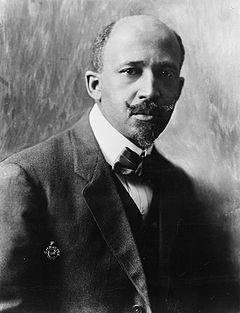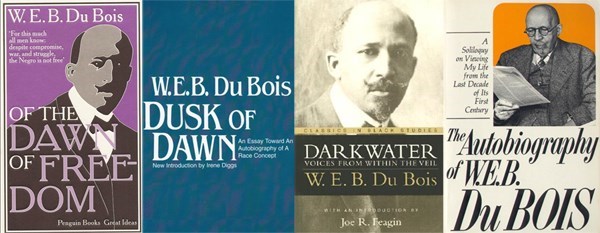 |
| W. E. B. DuBois in 1918 (Wikipedia) |
William Edward Burghardt (W.E.B.) DuBois was born three years after the end of The Civil War on February 23, 1868. He lived in a small black community in Great Barrington, Massachusetts. William was greatly influenced by his Mother, Mary Silvina DuBois, who strongly encouraged him to get a good education. She along with William worked many odd jobs and sacrificed greatly for him to be able to go to school. William did not grow up knowing his father, Alfred DuBois, who left the family when William was very young.
William was a very good student. He was especially good at writing. He graduated at the age of sixteen. William was the first black child to graduate from his high school. He then attended Fisk University in Nashville, Tennessee and also studied at The University of Berlin in Germany. He went on to complete his graduate work in 1895 at Harvard University in History becoming the first black man to earn a Ph.D.
William was mainly a writer and editor. He published nineteen books, edited four magazines, credited a magazine for children, and wrote many articles and speeches. Two of his greatest works were The Philadelphia Negro and Souls of Black Folk. He also taught at Wilberforce University in Ohio, the University of Pennsylvania, and Atlanta University. He taught such subjects as Greek, Latin, Sociology, and Economics. But he is best known for his writings and research that helped raise awareness into African American needs and causes.
 |
| Some of DuBois' many books. |
Regarding his civil rights accomplishments, William is named as the most important black protest leader in the United States during the first half of the 20th century. He played a major role in forming the “Niagara Movement” in 1906 which was meant to target civil injustices and social discrimination against African Americans. More importantly, this led William to help establish the National Association for the Advancement of Colored People (NAACP) in 1909. He is also known as the “Father of Pan-Africanism” which worked toward securing equal rights, self-government, independence, and unity for African people.
William DuBois spoke out against the injustices of the world. He was passionate about helping African Americans have equal rights and access to education, jobs and resources. He received considerable awards and honors. Most notable were the International Peace Prize and the Lenin Peace Prize. He received Honorary Degrees from many universities. His works and writings helped pave the way for the Civil Rights Movement in the 1950’s and 60’s. In 1961, William moved to Ghana where he died on August 27, 1963 on the eve of the historic march on Washington. Actor and playwright Ossie Davis read an announcement of his death to the 250,000 people gathered the next day at the Washington Monument.
Page created on 2/23/2011 12:00:00 AM
Last edited 2/23/2011 12:00:00 AM
Wikipedia.org. "Wikipedia - W. E. B. Du Bois." [Online] Available http://en.wikipedia.org/wiki/W._E._B._Du_Bois. 2011.
Hynes, Gerald C.. "A Biographical Sketch of W.E.B. DuBois." [Online] Available http://www.duboislc.org/html/DuBoisBio.html.
math.buffalo.edu. "W. E. B. duBois." [Online] Available http://www.math.buffalo.edu/~sww/0history/hwny-dubois.html.
Nedrow, Amy. "DuBois, William Edward Burghardt." [Online] Available http://www.pabook.libraries.psu.edu/palitmap/bios/DuBois__WEB.html. 2003.
Biography.com. "W.E.B. Du Bois Biography." [Online] Available http://www.biography.com/articles/W.E.B.-Du-Bois-9279924?part=0. 2011.
